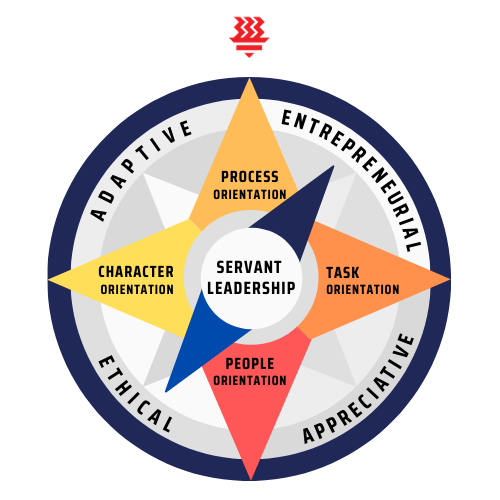A Leadership Centric Experience
The Ong Teng Cheong Leadership Development Model:

The Hwa Chongian as a servant leader is one who has people at the core of his being. He is therefore one whose primary purpose for leading is to serve others, by enabling others to accomplish their tasks and realize their potential. He is also someone who is grounded in strong fundamental moral values. Hence the emphasis on 4 orientations of Servant Leadership:
- Character Orientation
- People Orientation
- Task Orientation
- Process Orientation
One succeeds as a leader not by leadership skills but by values, respect, humility and having “a natural feeling that one wants to serve, to serve first. Then conscious choice brings one to aspire to lead”, as shared by Robert Greenleaf, the founder of modern Servant Leadership movement. The servant-leader is servant first, and the purpose of leading is to serve others.
The student leadership development journey in HCI starts with Self-Leadership.
Self-leadership is the foundation for all leaderships. It is an enabling process whereby the students learn to define who they are and what they want, through better self-understanding and personal mastery. It is also constructed within the framework of positive psychology and rooted in our strong foundation of Chinese values. It is about empowering oneself to personal excellence and achieving total wellness and living a pleasant, engaged and meaningful life (Seligman, Martin, 2000).
The foundation of self-leadership and leadership as a whole is Ethical leadership. It entails having a strong moral bearing in terms of values, integrity and moral purpose; and integrating these in their work, relationships, decision-making, etc. which can have positive effects on the morale of individuals, the dynamics and work ethics of the team, and the overall health and climate of the school.
People will always be more important than structures and tasks in accomplishing goals. Any system, process or change management are only effective if the people who make them workare effective. Servant leaders motivate and inspire others by understanding them, appreciating their strengths, investing in their development and empowering them to do their best, through Appreciative leadership approaches.
In a more disruptive VUCA (volatile, uncertain, complex and ambiguous) world, it is an even greater challenge to handle tough, uncomfortable, ambiguous and confrontational situations. The leader needs to demonstrate courage, tenacity, flexibility in thinking, and an open mind set. Servant leaders are equipped with Adaptive leadership competencies to mobilize people and resources, providing the steady leadership to navigate and thrive in a VUCA world.
Putting passion and energy into everything they do, servant leaders seek not only to handle the challenges of the VUCA world but also to thrive and flourish, by enabling, energizing and empowering people to accomplish what they want them to do in the most effective and humane way possible. They provide an uplifting experience for others, leading the charge as Entrepreneurial leaders.

